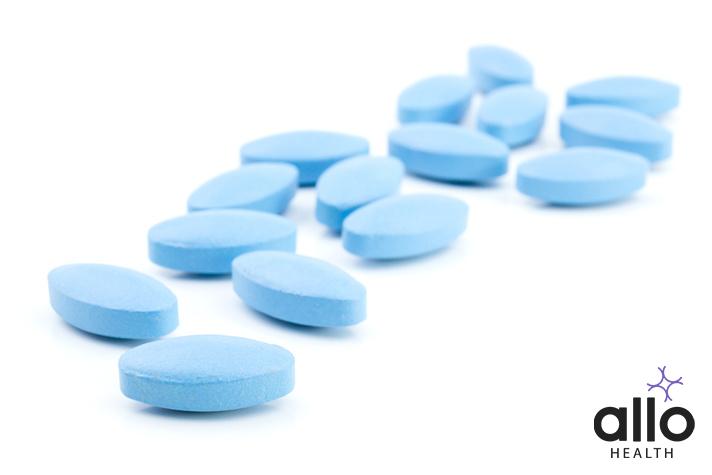Treatments of ED Due to Traumatic Masturbatory Syndrome

Allo Health is dedicated to personalized well-being, offering support and trusted information tailored to individual health goals. The platform emphasizes human-generated content, led by a distinguished medical team of experts, including physicians and sexual health specialists. Their commitment to credibility involves rigorous fact-checking, authoritative research, and continuous updates to ensure accurate, up-to-date information. Allo Health's unique approach goes beyond conventional platforms, providing expert-led insights and a continuous commitment to excellence, with user feedback playing a crucial role in shaping the platform's authoritative voice.

Dr. Aditi completed her undergraduate medical education at AJIMS, Mangalore, after which she worked in multi-speciality hospitals with COVID patients and in the Pain and Palliative medicine department. Driven by her experiences, she developed a keen interest in psychiatry. Dr. Aditi believes that mental health is just as, if not more important, than physical health.
Why This Was Upated?
Our experts continually monitor the health and wellness space, and we update our articles when new information became available.
Updated on 02 February, 2024
- Article was updated as part of our commitment to diversity, equity, and inclusion.

"The following blog article provides general information and insights on various topics. However, it is important to note that the information presented is not intended as professional advice in any specific field or area. The content of this blog is for general educational and informational purposes only.
Book consultation
The content should not be interpreted as endorsement, recommendation, or guarantee of any product, service, or information mentioned. Readers are solely responsible for the decisions and actions they take based on the information provided in this blog. It is essential to exercise individual judgment, critical thinking, and personal responsibility when applying or implementing any information or suggestions discussed in the blog."
Erectile dysfunction (ED) can be a challenging condition, and when it stems from traumatic masturbatory syndrome, the complexities increase. This article explores the treatment options and considerations for those facing ED due to this specific cause.
What is Erectile Dysfunction?
Erectile Dysfunction (ED) is a common medical condition where a man has difficulty achieving or maintaining an erection sufficient for sexual intercourse.
Causes of ED include:
- Physical Factors: Heart disease, diabetes, high blood pressure, hormonal imbalances, and obesity.
- Psychological Factors: Stress, anxiety, depression, and relationship concerns.
- Lifestyle Choices: Smoking, excessive alcohol consumption, and illicit drug use.
Symptoms of ED:
- Inconsistent Erection: Inability to maintain an erection consistently.
- Reduced Sexual Desire: Noticeable decrease in sexual interest.
- Trouble Getting an Erection: Difficulty in achieving an erection during sexual activity.
ED can be a sign of health concerns needing treatment and can impact mental and emotional health. Consulting a healthcare provider for a proper diagnosis and treatment plan is essential.
What is Traumatic Masturbatory Syndrome?
Traumatic masturbatory syndrome (TMS) is a medical condition primarily stemming from certain masturbation habits, particularly those involving unusual or vigorous techniques. Understanding its symptoms and risk factors is essential for identifying and addressing this condition.
Symptoms of Traumatic Masturbatory Syndrome
- Erectile Dysfunction (ED): Difficulty in achieving or maintaining an erection during sexual activity or intercourse.
- Decreased Sensitivity: Reduced sexual pleasure or difficulty reaching orgasm due to nerve damage from excessive or vigorous masturbation.
- Pain or Discomfort: Experiencing pain during or after masturbation or sexual intercourse.
Risk Factors
- Prone Masturbation: Masturbating in a face-down position can cause excessive pressure and friction, leading to ED.
- Vigorous Masturbation Techniques: Using intense pressure or speed can lead to nerve damage and decrease sexual sensitivity.
- Frequency of Masturbation: Excessive masturbation, especially with unusual techniques, increases the risk of TMS.
- Porn Consumption and Porn Addiction: Overreliance on visual stimuli from porn can alter sexual response and contribute to porn-induced ED.
- Death Grip Syndrome: A form of TMS where an extremely tight grip during masturbation reduces sensitivity to normal sexual stimuli.
- Performance Anxiety and Emotional Factors: Psychological factors can exacerbate the symptoms of TMS, leading to further sexual dysfunction.
- Compulsive Porn Users: Individuals with a high consumption of pornography might develop unrealistic expectations and dependencies affecting normal sexual function.
Recognizing these symptoms and risk factors is crucial for timely intervention. Treatment can involve behavioral therapy, moderation in masturbation habits, and seeking professional advice from a healthcare provider or sex therapist. Addressing TMS is essential for maintaining both sexual and overall health.
Can You Get ED due to Traumatic Masturbatory Syndrome?

Erectile dysfunction (ED) can indeed stem from traumatic masturbatory syndrome, a condition often overlooked in sexual health discussions. Here’s how this connection is typically understood:
- Unusual Masturbation Techniques: TMS often involves prone masturbation, where individuals lie face-down and apply intense pressure to the genital area. This method can differ significantly from the sensations experienced during normal intercourse or conventional masturbation.
- Nerve Damage: Vigorous masturbation techniques, often associated with TMS, can cause physical harm to the nerves in the genital area. This nerve damage can result in decreased sensitivity, making it difficult to achieve or maintain an erection during sexual intercourse.
- Psychological Factors: The association between certain masturbation practices and sexual gratification can lead to performance anxiety. Men may find that they are unable to achieve an erection due to the psychological stress associated with the need to perform in a different manner during sexual activity with a partner.
- Porn Consumption and Porn Addiction: High levels of porn consumption, often linked with TMS, can alter an individual’s response to sexual stimuli. This phenomenon, sometimes referred to as porn-Induced ED, can make it challenging to become aroused in more typical sexual scenarios.
- Desensitization: Frequent and intense masturbation, a common characteristic of TMS, can lead to a form of desensitization, where the body requires increasingly intense sexual stimulation to achieve sexual arousal and erection, which may not be replicable during normal sexual intercourse.
Traumatic masturbatory syndrome can lead to erectile dysfunction through a combination of physical nerve damage, psychological stress, altered sexual response due to unusual masturbation habits, and concerns related to porn consumption and addiction. Addressing these factors is crucial in treating ED associated with TMS.
Scientific Research and Studies Regarding ED and TMS
There have been a few significant studies and proposals on the treatment of erectile dysfunction (ED) caused by traumatic masturbatory syndrome (TMS).
- A study published in the International Journal of Urology conducted a matched case-control investigation to understand the impact of atypical masturbatory behaviors (AMB) on erectile dysfunction. The study found that behaviors like rubbing in a prone position and applying pressure to the penis while masturbating were more common in young men with ED. This study highlights the relationship between these behaviors and the condition, suggesting that AMBs could be a contributing factor to ED in younger males.
- Another study, published in Andrologia, explored whether atypical masturbation behavior is a predisposing factor in ED etiology in premature ejaculation patients. The study involved a large sample of patients and found that atypical masturbatory behaviors such as masturbating ‘through clothes’ and ‘rubbing in prone position’ were significantly higher in patients with ED. This indicates that such behaviors might increase the rate of erectile dysfunction accompanying premature ejaculation, emphasizing the importance of questioning masturbation habits in these cases.
These studies highlight the significance of recognizing and addressing atypical masturbatory behaviors in the treatment of ED, particularly when linked to TMS. They suggest that a comprehensive approach involving both behavioral modifications and psychological therapy can be effective in treating this condition.
Treatment Options

Erectile dysfunction (ED) resulting from traumatic masturbatory syndrome can be complex, but several treatment options exist. It’s essential to integrate approaches that address both physical and psychological aspects.
Behavioral Therapy and Modification Techniques:
- Addressing unusual masturbation techniques like prone masturbation.
- Reducing the frequency of masturbation, especially avoiding vigorous masturbation techniques.
- Education on the difference between prone position masturbation and normal, conventional masturbation.
Medical Treatment:
- Prescription Drugs: Use of oral drugs like PDE5 inhibitors, considering common and adverse side effects.
- Testosterone Replacement Therapy: If tests indicate abnormal levels of testosterone contributing to ED.
- Vacuum Erection Devices: For achieving erection without medication in cases where nerve damage might be a factor.
Psychological and Emotional Support:
- Consulting a sex therapist to address psychological factors, such as performance anxiety and porn addiction.
- Behavioral therapy focusing on emotional factors underlying compulsive porn users or traumatic masturbatory habits.
Lifestyle Adjustments and Sexual Health Education:
- Educating about the negative effects of excessive masturbation and the health benefits of balanced sexual activity.
- Encouraging normal sexual intercourse and reducing reliance on porn consumption.
Addressing Co-occurring Sexual Dysfunctions:
- Treatment for related concerns like premature ejaculation or other sexual disorders.
- Special attention to any potential spinal cord injury or nerve damage.
Consultation with Health Care Providers:
- Regular check-ups with a healthcare provider to monitor progress and adjust treatment plans.
- Mental health support to deal with any associated distress or anxiety.
Treating ED due to traumatic masturbatory syndrome involves a combination of medical treatment, psychological support, and lifestyle changes. It’s crucial to recognize the importance of sexual health and seek professional guidance for a comprehensive treatment plan.
Preventive Measures
Erectile dysfunction (ED) related to traumatic masturbatory syndrome can be prevented by adopting various lifestyle and behavioral changes. Here are key preventive measures:
- Practice Normal Masturbation Techniques: Shift from prone or unusual masturbation techniques to conventional methods. This helps prevent the nerve damage and erectile concerns often associated with traumatic masturbatory syndrome.
- Regulate Frequency of Masturbation: Avoid excessive masturbation. Maintaining a balanced frequency can prevent the negative effects associated with overindulgence and vigorous masturbation techniques.
- Address Porn Consumption: Reduce or eliminate porn consumption, particularly if it leads to porn addiction or porn-induced ED. This can help in maintaining a healthy response to sexual stimuli.
- Mental Health Awareness: Addressing psychological factors like performance anxiety through counseling or therapy. Emotional factors can play a significant role in sexual health and functioning.
- Sexual Health Education: Educate yourself about the health benefits and risks associated with different sexual activities. Understanding the implications of certain masturbatory practices can help in making informed decisions.
- Consult Health Care Providers: Regular check-ups with a healthcare provider or a sex therapist can help in identifying early signs of ED and provide guidance on healthy sexual practices.
- Lifestyle Modifications: Engage in activities that promote vascular and overall health, like regular exercise and a balanced diet. A healthy lifestyle can significantly reduce the risk of conditions like heart disease, which is indirectly linked to ED.
- Avoid Substance Abuse: Limiting alcohol intake and avoiding illicit drugs can prevent ED. Substance abuse can exacerbate sexual dysfunctions and other health concerns.
By implementing these measures, individuals can significantly reduce their risk of developing ED related to traumatic masturbatory syndrome, thereby maintaining both sexual and overall health.
Conclusion
Traumatic masturbatory syndrome and its resultant ED require a complex approach. Treatment involves addressing physical, psychological, and behavioral factors. Consulting health care providers and considering a combination therapy involving medication, counseling, and lifestyle changes can significantly improve outcomes. Remember, sexual health is an integral part of overall well-being, and addressing concerns like ED is crucial for a healthy, fulfilling life.
Most Asked Questions
-
What exactly is traumatic masturbatory syndrome?
Traumatic masturbatory syndrome happens when someone masturbates in a way that’s not typical, like lying face down and pushing hard against their body. This can hurt the nerves and lead to problems like erectile dysfunction (ED), where it becomes hard to get or keep an erection.
-
Can changing how I masturbate help fix my ED?
Yes, changing your masturbation habits can help. If you’ve been masturbating too much or using a lot of pressure, easing up on these practices can give your body time to heal. Try to adopt more gentle and less frequent methods.
-
Should I see a doctor or therapist for my ED?
Yes. Seeing a health care provider can help find out if your ED is because of the way you masturbate. They might suggest medicines or therapies. A sex therapist can also help you deal with any worries or emotional concerns linked to ED.
-
Are there any other health risks from masturbating too much or in the wrong way?
Masturbating too much or in a way that’s not typical can possibly affect your heart and nerves. It can also make you feel stressed or anxious. If you’re worried about this, it’s a good idea to talk to a doctor or a mental health professional.






































